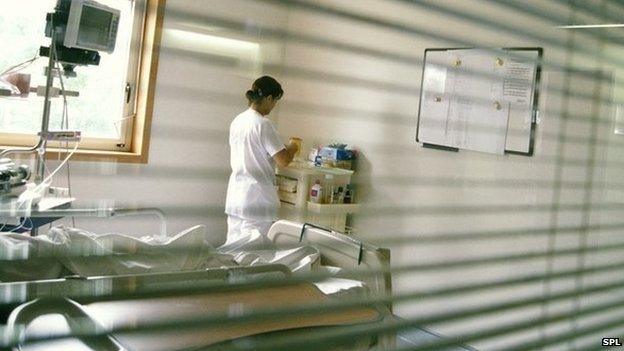Overseas nurses and midwives 'face shorter assessments'
- Published

Two different tests will assess whether applicants are fit to practise in the UK
Nurses and midwives who complete their training in hospitals outside Europe will now face shorter tests to check they are fit to work in the UK.
The Nursing and Midwifery Council (NMC) says its plans include a computer-based exam and tests in simulated clinical scenarios.
And the regulator says these will replace the minimum three months of supervised practice currently required.
But nurse leaders warn they need more details to confirm checks are adequate.
At the moment nurses and midwives who have trained overseas make up about 10% of the workforce registered to work in the UK.
Around 1,000 nurses a year come to work in the UK from outside the European Economic Area - the majority from Australia, India or the Philippines.
'Agile process'
The NMC says one of the reasons behind the change to assessments is that the current supervised placements - which can last between three months and one year - are not fast enough to meet demand.
The regulator says the system is "not agile enough for employers who need to recruit quickly".
And the experts report applicants have had difficulties obtaining places on the programme, as they are in short supply.
The new tests, planned to start in the autumn, consist of two parts:
A computer-based multiple choice exam, discussing various situations
Observing applicants during simulated healthcare scenarios

Nurses and midwives who have trained overseas currently make up about 10% of the workforce
Similar checks have already been adopted by other healthcare regulators, according to the NMC.
The regulator says: "This will ensure the hundreds of nurses and midwives who trained overseas and wish to practise in the UK are assessed in a a proportionate and robust way, in order to protect the public."
Jackie Smith, the NMC chief executive, said: "The new system will not replace the need for employers to ensure that the staff they recruit display the behaviours, skills and knowledge necessary for the specific role to which they are recruited, and provide further support and development as required."
'Dedicated workers'
Janet Davies, executive director of nursing at the Royal College of Nursing said: "Health care in the UK relies on the hard work and dedication of many nurses who trained overseas.
"These proposals may well form part of a more robust and consistent mechanism for ensuring that nurses who work in the UK are equipped to practise in the UK.
"However, we need to know more about how nurses will be evaluated as part of this system before we can judge whether or not the system is adequate.
"Whether nurses come from the EU or the rest of the world, it is vital that employers are recruiting them for the right reasons and supporting them when they get there.
"Too often, nurses are recruited from overseas to fill short term gaps and given inadequate support to care for patients well."
Official figures suggest some 67,000 nurses and midwives who completed training outside Europe currently hold NMC registration.
This adds to the present workforce of more than 600,000 nursing and midwifery staff who have trained within Europe and gained registration with the UK regulator.
- Published11 March 2014
